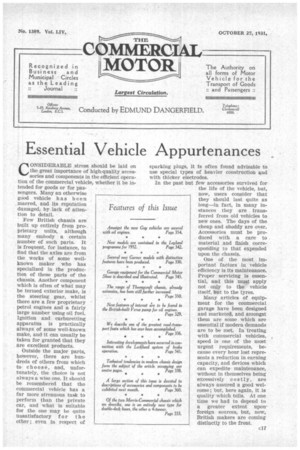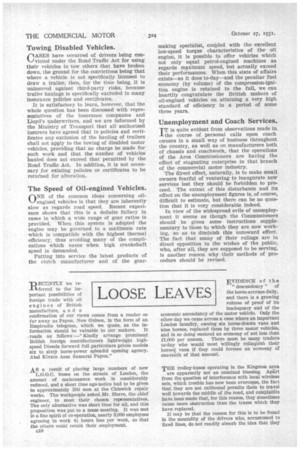Essential Vehicle Appurtenances
Page 67

Page 68

If you've noticed an error in this article please click here to report it so we can fix it.
CONSIDERABLE stress should be laid on the great importance of high-quality accessories and components in the efficient operation of the commercial. vehicle, whether it be intended for goods or for pas sengers. Many an otherwise good vehicle has b een marred, and its reputation damaged, by lack of attention to detail.
Few British chassis are built up entirely from proprietary units, although many embody a certain number of such parts. It is frequent, for instance, to find that the axles are from the works of some wellknown maker who has specialized in the production of these parts of the chassis. Another component which is often of what may be termed exterior make, is the steering gear, whilst there are a few proprietary petrol engines and a fairly large number using oil fuel. Ignition and carburetting apparatus is practically altvays of some well-known make, and it can usually be taken for granted that they are excellent products.
Outside the major parts, however, there are hundreds of others from which to choose, and, unfortunately, the choice is not always a wise one. It should be remembered that the commercial vehicle has a far more strenuous task to perform than the private car, and what is suitable for the one may be quite unsatisfactory for the other ; even in respect of sparking plugs, it is often found advisable to use special types of heavier construction and with thicker electrodes.
In the past but few accessories survived for the life of the vehicle, but, now, users consider that they should last quite as long—in fact, in many instances they are transferred from old vehicles to new ones. The days of the cheap and shoddy are over. Accessories must be produced with a care to material and finish corresponding to that expended upon the chassis.
One of the most important factors• in vehicle efficiency is its maintenance. Proper servicing is essential, and this must apply not only to the vehicle itself, but to the tyres.
Many articles of equipment for the commercial garage have been designed and marketed, and amongst them are some which are essential if modern demands are to be met. In treating with commercial vehicles, speed is one of the most urgent requirements, because every hour lost represents a reduction in earning capacity, and devices which can expedite maintenance, without in themselves being excessively costly, are always assured a good welcome; but, here again, it Is quality which tells. At one time we had to depend to a greater extent upon foreign sources, but, now, British makers are coming distinctly to the front.
Towing Disabled Vehicles.
CASES have occurred of drivers being convicted under the Road Traffic Act for using their vehicles to tow others that have broken down, the ground for the convictions being that where a vehicle is not specifically licensed to draw a trailer, then, for the time being, it is uninsured against third-party risks, because trailer haulage is specifically excluded in many insurance policies and certificates.
It is satisfactory to learn, however, that the whole question has been discussed with representatives of the insurance companies and Lloyd's underwriters, and we are informed by the Ministry of Transport that all authorized insurers have agreed that in policies and certificates any exclusion of the hauling of trailers shall not apply to the towing of disabled motor vehicles, providing that no charge be made for such work and that the number of vehicles hauled does not exceed that permitted by the Road Traffic Act. In addition, it is not necessary for existing policies or certificates to be returned for alteration.
The Speed of Oil-engined Vehicles.
ONE of the common ideas concerning oilengined vehicles is that they are inherently slow as regards road speed. Recent experience shows that this is a definite fallacy in cases in which a wide range of gear ratios is provided. When this system is adopted the engine may be governed to a maXimuin rate which is 'compatible with the highest thermal efficiency, thus avoiding many of the complications which ensue when high crankshaft speed is demanded.
Putting into service the latest products of the clutch manufacturer and of the gear making specialist, coupled with the excellent low-speed torque characteristics of the oil engine, it is possible to offer vehicles which not only equal petrol-engined machines as regards maximum speed, but actually exceed their performances. When this state of affairs exists—as it does to-day—and the peculiar fuel economy (by volume) of the compression-ignition engine is retained to the full, we can heartily congratulate the British makers of oil-engined vehicles on attaining a very high standard of efficiency in a period of some three years.
Unemployment and_ Coach Services.
TT is quite evident from observations made in_ -I-the course of personal calls upon coach owners in a small way of business throughout the country, as well as on manufacturers both of chassis and coachwork, that the operations of the Area Commissioners are having the effect of stagnating enterprise in that branch of the commercial motor industry.
The direct effect, naturally, is to make small owners fearful of venturing to inaugurate new services lest they should be forbidden to proceed. The extent of this disturbance and its effect on the unemployment figures is, of course, difficult to estimate, but there can be no question that it is very considerable indeed.
In view of the widespread evils of unemployment it seems as though the Commissioners should be given some instructions supplementary to those to which they are now working, so as to diminish this untoward effect. The fact that many of their rulings are in direct opposition to the wishes of the public, who„ after all, they are supposed to be serving, is another reason why their methods of procedure should be revised.




































































































































































